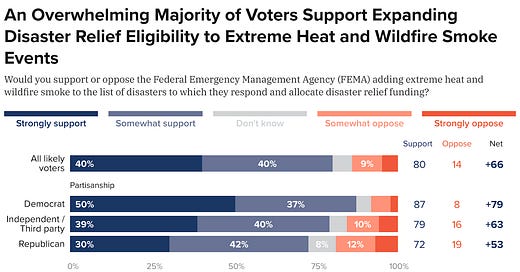You Can’t Spell “Extreme Heat” and “Wildfire Smoke” Without “FEMA”
Welcome back to Data for Climate Progress — your one-stop shop for all things climate at Data for Progress.
Welcome back to Data for Climate Progress — your one-stop shop for all things climate at Data for Progress. Catch us here every month for our latest climate polling, juicy insights, and can’t-miss reading lists.
As always, we’d love to hear from you — drop us (Grace Adcox and Catherine Fraser) a line at gracea@dataforprogress.org and catherine@dataforprogress.org. Forwarded this email? You can subscribe below.
Meet Margo, DFP’s Summer Climate Intern!
Hi everyone!
My name is Margo Kenyon (she/her), and at the beginning of this month, I had the pleasure of joining the Data for Progress Climate Team as the Climate and Energy Program Intern. I am currently a rising senior at Colby College in my home state of Maine, where I am pursuing dual majors in environmental policy and government. Outside of academics, I am an active competitor for the cross-country and track teams, and I also serve as the secretary of Colby Pre-Law Society.
Upon graduation, I aspire to build a career in public policy, dedicated to working collaboratively with communities to implement sustainable and equitable solutions that address social and environmental injustices. My experience at Data for Progress so far has continued to reinforce these aspirations, and I am enthusiastic about the opportunities and experiences that lie ahead for the remainder of my summer internship!
In my role at Data for Progress, I collaborate closely with the climate team to advance progressive climate and energy policy. My responsibilities include assisting in the execution and dissemination of polling, research, and policy proposals, with much of my work centered on community benefits. This summer, I will also be designing and fielding my own survey, which will focus on analyzing voter sentiment around synthetic chemicals known as per- and polyfluoroalkyl substances (PFAS). Stay tuned for the results!
Got a burning climate question to ask voters? Just want to say hi? Send me an email at margo@dataforprogress.org!
FDR Would Be Proud: The ACC Is the New CCC
In partnership with The Corps Network, we ran a new poll to assess public sentiment around service corps and their relationship to climate change. Our findings suggest that concerns about climate change are increasingly bipartisan, though, notably, voters between ages 18 and 34 (82%) are much more concerned about climate change than older voters. In alignment with broadening national concerns about climate change, more than half of voters (53%) agree with a statement claiming that national public service organizations can fill the urgent need to address climate change and pollution. Read the brief here.
Cheeseheads Support Making Polluters Pay
While Wisconsinites may be known for their love of dairy products (ahem, Gov. Evers), we and our friends at the Center for Climate Integrity (CCI) find that they're fans of making polluters pay, too. Eighty-one percent of voters in the state say that major oil and gas companies should be responsible for at least some portion of the climate costs that Wisconsin will face in the coming decades, while nearly half (47%) believe that major oil and gas companies should be responsible for all or most of the climate costs that the state will face. Read our memo here and CCI’s full report here.
ICYMI: Voters Down to Charge Big Oil With Climate Homicide
Recently, The Guardian featured new Data for Progress polling on the hot topic of climate homicide, or holding Big Oil legally accountable for climate-related deaths. We’ve followed up on that original coverage with a new brief diving into these polling results! Sixty-two percent of voters believe that oil and gas companies should be held accountable for their contributions to climate change. Among those who feel the fossil fuel industry should be held legally accountable, 54% express that the industry should be held legally accountable for endangering the public and causing potential harm to the public in the future. Read the piece in full here.
You Can’t Spell “Extreme Heat” and “Wildfire Smoke” Without “FEMA”
By Margo Kenyon
With record-breaking heat spanning much of the U.S. this past week, it should be of no surprise to hear that 2024 could surpass 2023 as the hottest year on record. At a glance, extreme heat might seem less concerning than other natural disasters, but this disaster is definitely something to sweat over. Heat waves have been the top cause of U.S. weather-related deaths over the last 30 years, and are only projected to become more intense and more frequent. What’s more, extreme heat disproportionately affects communities of color and low-income communities, who are more likely to live in urban heat islands. Growing alarm around extreme heat recently led activists to renew calls for the Federal Emergency Management Agency (FEMA) to add extreme heat, as well as wildfire smoke, to the list of disasters to which it responds.
New polling from Data for Progress finds that activists are not alone in their concerns over extreme heat, with nearly a quarter of voters (24%) saying that extreme heat concerns them the most among various types of extreme weather events, followed by tornadoes (16%), hurricanes (13%), and wildfires (10%). Reflecting these concerns over extreme heat, a strong majority of voters (80%) support FEMA adding extreme heat and wildfire smoke to the list of disasters to which it responds and allocates funding. This includes majorities of Democrats (87%), Independents (79%), and Republicans (72%).
Voters also express support for implementing additional measures to mitigate extreme heat. After reading a statement describing how landlords currently aren’t obligated to provide renters with air conditioning or other cooling services, but are required to provide home heating in the winter, 79% of voters report that they would support a policy requiring landlords to provide renters with air conditioning or cooling during extreme heat events. Similarly, 79% of respondents say that they would support investments in cooling infrastructure for marginalized communities, when they are informed that extreme heat disproportionately affects such communities.
As concern over extreme heat and the need for disaster relief funding in the U.S. continues to heighten, it’s imperative to hold our politicians accountable for providing sufficient resources for disaster preparedness and response, in addition to implementing sustainable solutions that mitigate the impacts of extreme heat. You can read the full brief here.
Climate, State, and Utopia, by Olúfẹ́mi O. Táíwò (Boston Review)
To Win a Climate Election, Don’t Say ‘Climate’, by Jeva Lange (Heatmap)
What Will Become Of American Civilization?, by George Packer (The Atlantic)
What If We Just Nationalize the Power Grid?, by Melanie Brusseler and Sandeep Vaheesan (Heatmap)














